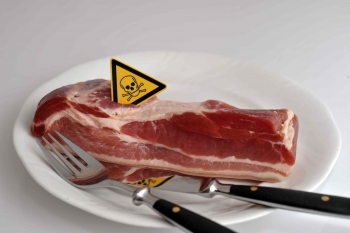Learn about the causes of Food Poisoning & find a practitioner in Auckland, Hamilton, Bay of Plenty, Wellington, Christchurch, Dunedin to help you overcome Food Poisoning within New Zealand.
Food poisoning occurs when contaminated food or drink is consumed. Contamination can be from excessive bacterial growth, bacteria toxins, chemicals or pesticides. Symptoms of food poisoning include stomach pain, vomiting, fever, diarrhoea, muscular aches and dehydration. Food poisoning can last up to a week depending on the type of bacteria or severity of infection. Food poisoning is usually mild but extreme cases can lead to paralysis or death.
Causes of food poisoning
 Food contamination can occur during any stage of food production and
preparation from growth, to transportation, to processing, to cooking and finally to eating.
Food contamination can occur during any stage of food production and
preparation from growth, to transportation, to processing, to cooking and finally to eating.
Food poisoning is typically caused by:
Cross-contamination – This is a common cause of food poisoning and yet many people are unaware of the dangers. When preparing foods such as raw chicken, if you slice the chicken on a chopping board and forget to wash the board before preparing another meal on it (such as a sandwich), harmful bacteria from the chicken (which is usually killed off during the cooking process) can spread from the chopping board on to the next meal.
When slicing raw meats or raw poultry on any board or surface, you should never go and place cooked meat on the same board or surface without having washed it thoroughly.
Common sources of contamination include bacteria, viruses, parasites and toxins.
Bacteria – Food contamination is typically caused by bacteria such as Campylobacter, Salmonella, Listeria and E-coli.
Campylobacter is the most common cause of food poisoning and is found in raw meats, raw poultry, untreated water and unpasteurised milk. Salmonella can be passed into dairy products and is also found in raw meats and raw poultry.
Listeria is commonly found in chilled food products such as butter, cooked meats, smoked salmon, pre-prepared sandwiches, pate and soft cheese. E-coli (Escherichia coli) is a bacteria found in the digestive system and many strains are harmless however the 0157 strain can cause serious illness. Undercooked beef and unpasteurised milk are common foods that can cause E-coli.
Viruses – People infected with either the rotovirus or norovirus can contaminate food if they do not wash their hands properly before handling it. The norovirus is sometimes called the 'winter vomiting virus' as most cases occur around this time of year.
Parasites – Toxoplasmosis is caused by parasites found in the digestive system of animals (primarily cats). Consuming food or water contaminated with the faeces of cats can lead to this parasitical form of food poisoning.
Toxins - Toxins found in contaminated fish can pose a potential risk to pregnant women and their unborn babies. It is advisable not to eat more than two portions per week of: fresh tuna, mackerel, sardines, trout and salmon.
High levels of Mercury found in Shark, Swordfish, Marlin and Tuna Steaks also pose a health risk to unborn babies.
Symptoms of food poisoning develop anywhere from one hour to 90 days after consumption and this period is known as the incubation period. On average, it takes 1-3 days for food poisoning symptoms to develop.
The common food poisoning symptoms include:
he majority of food poisoning cases do not require a diagnosis but if your symptoms are severe then you should seek medical attention. Contact your GP if:
A GP will question you about possible contact with contaminated foods or liquids and if necessary will refer you for blood tests. You may also be required to provide a stool sample to test for bacteria or parasites.
If the infection is thought to have spread from your digestive system then further tests may be required. These can include:
*Source: GoToSee.co.uk